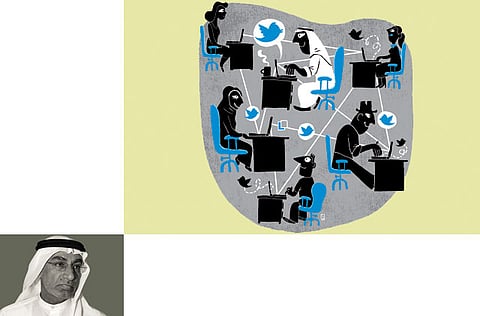The exciting and alarming world of UAE Twitter
In this calm, stable and non-controversial country, cyberspace need not be so divisive

Suddenly everybody in the UAE seems to be either on Twitter or talking about this 140-character virtual sensation. Top officials, academics, activists, laymen, sages and trolls, the good, the bad and the ugly have all migrated to Twitter. People, especially the digital-native youth are joining Twitter in droves. Alarmingly, some have become Twitter addicts and are already consulting books on ‘how to leave Twitter'. But Dubai police is seriously considering utilising Twitter to summon people and the Abu Dhabi Education Authority has plans to encourage its nearly 250,000 students to use Twitter as an educational tool.
On March 21, Twitter celebrated its sixth birthday while announcing that it has more than 200 million users and sees 500 million tweets per day — that is 30,000-plus tweets for every single minute. Not surprisingly, the US has by far the biggest number of user accounts. Brazil is in second place with Japan just behind.
The number of Twitter users in the UAE is fast approaching 200,000. The active UAE Twitter community (those who tweet regularly as opposed to the vast number of passive account holders) is close to 30,000. Some elite Twitter users in the UAE already have over 100,000 followers and have joined the Twitter major league club. These avid users of Twitter and the internet are now commonly known as the Netizens (a portmanteau of the words internet and citizen). They are the growing citizens of the brand new ‘global tent' that has replaced the outdated global village of the 20th century.
Arab Netizens nearly doubled during the epochal year of the Arab Spring of 2011, which ended 40 years of political stagnation and ushered in a new dawn in contemporary Arab history. The Emirati version of the Arab Spring is strictly a virtual spring full of youthful energies, where there is a burst of vocal voices and sharper than usual activities and debates.
Controversial issues that are never talked about in the public sphere in the UAE are now virtually discussed on Twitter. Issues such as the rise of Islamists in the region, the expanded role of security in society, the UAE5 and the UAE7, loyalty to the country and the general topic of political reform and democracy are hotly and emotionally debated on Twitter in ways not possible in the rather colourless mainstream media.
Healthy interactions
Some Twitter users are getting nasty but the majority are calm and decent in expressing opinions on these and other topics of debates. The UAE authorities have promised to implement round the clock monitoring of Twitter and the other social media websites without compromising personal liberties and individual privacy. There are already several pending court cases of published comments on Twitter deemed defamatory and insulting.
It is only on Twitter that the whole spectrum, the best and the worst, of views is in the open. No wonder Twitter is viewed as both a very exciting and extremely alarming tool of the new social media. There are as many healthy interactions as well as negative energies spilled all over the UAE Twitter landscape. It has moved the public debate one step forward but has also pulled it half a step back.
On the promising side, fresh and unconventional voices are heard on Twitter these days. A greater number of people are found on Twitter expressing views, feelings and anger. The younger generation has come forward competing with established and establishment opinion makers. Current and controversial issues are being discussed openly on Twitter for the first time. Freedom of expression has expanded beyond the limit of the self and state censorship. What is said on Twitter can't be said elsewhere. Everyone is on their own, to say it all and be responsible for what they stand for. Many have been creative and daring at pushing the envelope on the social and political issues of the day.
However, Twitter has raised some legitimate concerns and there have been a few setbacks. The cyber sphere has been unnecessarily divisive and polarising for the mostly calm, stable and non-controversial UAE. Twitter is massively used, misused and abused by the yelling and screaming crowd exposing the intellectual hollowness of socio-political discourse in the UAE.
Sadly, Twitter has attracted extremist elements in society, unnecessarily raised social tensions and created a dent in the once solid social fabric of society. The government reluctantly moved to crack down and arrest net activists and bloggers during the tumultuous 2011. These state actions did not reflect well on the UAE's latest country ranking on media freedom and enemies of the internet annual list produced by international NGOs. As alarming as the initial stage of Twitter has been, the current tensions will eventually settle down. Netizens are after all good citizens and Twitter is fast developing as a credible alternative to the largely timid mainstream media. Twitter is no longer virtual, it has created a space for itself and it is here to stay, bringing much needed excitement to the public debate.
Dr Abdulkhaleq Abdulla is Professor of Political Science. You can follow him on Twitter at www.twitter.com/Abdulkhaleq_UAE



